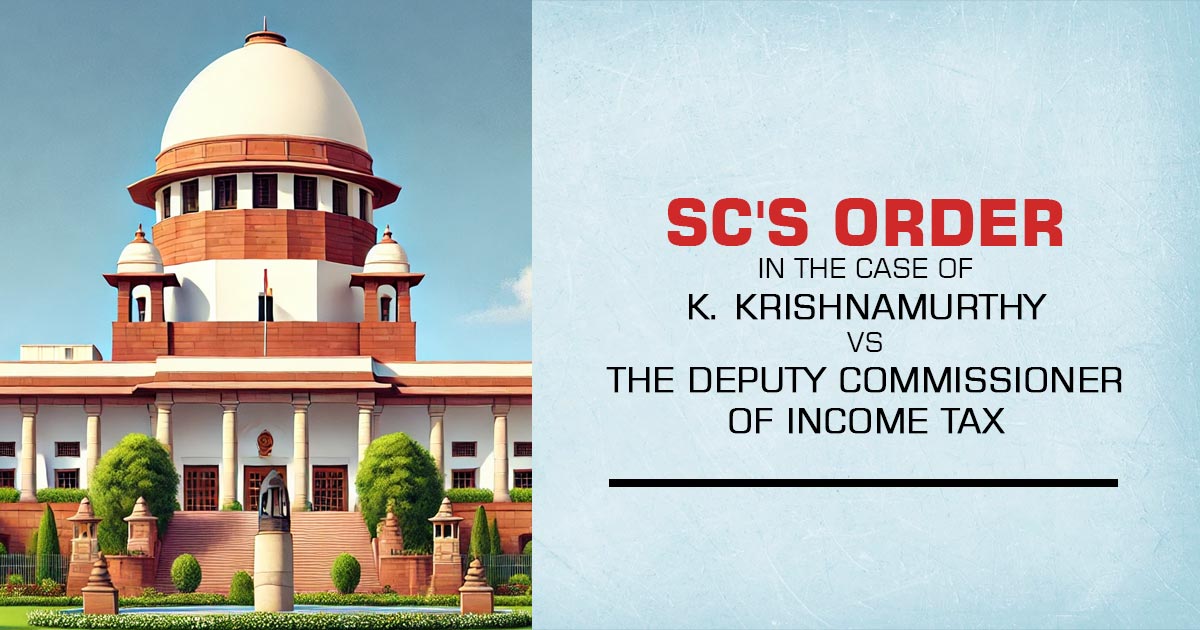
While determining a tax matter, the Apex court noted that the undisclosed income u/s 271AAA(1) of the Income Tax Act, surrendered by the taxpayer during the search, is not enough to impose the penalty.
The mentioned provisions cited the penalty where a search has been started. The explanation reads as
“(a) “Undisclosed income” means— (i) any income of the specified previous year represented, either wholly or partly, by any money, bullion, jewellery or other valuable article or thing or any entry in the books of account or other documents or transactions found in the course of a search under section 132, which has— (A) not been recorded on or before the date of search in the books of account or other documents maintained in the normal course relating to such previous year; or……”
The Supreme Court, before imposing any penalty, the assessing officer should fulfil the norms given in the aforesaid explanation.
“Consequently, it is obligatory on the part of the Assessing Officer to demonstrate and prove that undisclosed income of the specified previous year was found during the course of search or as a result of the search.,” the Court said.
In the current case, an investigation was performed at the premises of the appellant and as a consequence, the appellant revealed an income of a specific amount. An order levying a penalty u/s 271AAA was passed against the appellant.
When contested the Commissioner of Income Tax (CIT) rejected the appeal of the appellant and it was too dismissed via the appellate tribunal. The case arrived before the Apex court as the High Court was also dismissed.
The Bench of Justices J.B. Pardiwala and R. Mahadevan at the outset pursued the whole provision in detail. It noted that as per Section 271AAA(1), the assessing officer may ask the taxpayer in a case where a search was performed, to file a penalty. But it is not obligatory to levy a penalty, the court mentioned and noted-
“This Court is of the view that though under Section 271AAA(1) of the Act 1961, the Assessing Officer has the discretion to levy penalty, yet this discretionary power is not unfettered, unbridled and uncanalised. Discretion means sound discretion guided by law. It must be governed by rule, not by humour, it must not be arbitrary, vague and fanciful.”
Arriving on section 271AAA(2), it is noted that the penalty should not be imposed in matters where the taxpayers consider the undisclosed income, verify how such income was derived, and pay the tax.
Read Also: ITAT Supports Penalty Deletion Due to No Search Operation U/S 271AAB
For reference, sub-section (2) of Section 271AAA states:
(2) Nothing included in sub-section (1) shall apply if the taxpayer,
- In the search proceedings, a statement under sub-section (4) of section 132, admits the undisclosed income and determines how such income has been derived;
- confirms how the undisclosed income was derived; and
- files the tax, together with interest, if any, concerning the undisclosed income.
“Consequently, if the aforesaid conditions (i) and (ii) are satisfied and the tax together with interest on the undisclosed income is paid up to the date of payment, even with delay, in the absence of a specific period of compliance, then penalty at the rate of 10% (Ten per cent) under Section 271AAA of the Act 1961 is normally not leviable.”
The court concerning the same concluded that as the appellant has considered Rs 2,27,65,580 as income for the assessment 2011-12 in the search and had adhered to the above said pre-requisites, no penalty is imposed. But concerning the specific amount the court mentioned that the said income was not admitted under the head income from other sources in the search.
“The argument that the said transactions had not been found in the search at the Appellant’s premises but had been found due to ‘copies of sale deeds collected from the society’ cuts no ice with this Court as the sale deeds had been collected as a result of the search and in continuation of the search. This Court is of the view that as the causation for collecting the sale deeds from the Society was the search at the Appellant’s premises, it cannot be said that the said documents were not found in the course of the search.”
Recommended: How Are Tax Payments Benefiting Online for Taxpayers
The court expressed that the expression discovered in the course of the search does not just direct the documents discovered in the premises of the taxpayer.
“At times, search of an assessee leads to a search of another individual and/or further investigation/interrogation of third parties. All these steps and recoveries therein would fall within the expression ‘found in the course of search’.,” the Court articulated.
The court for the same has disposed of the plea with a direction to the appellant to file a penalty at a 10% rate merely concerning the aforementioned amount.
| Case Title | K. Krishnamurthy vs. The Deputy Commissioner of Income Tax |
| Citation | CIVIL APPEAL NO. 2411 OF 2025 |
| Date | 13.02.2025 |
| Supreme Court | Read Order |









